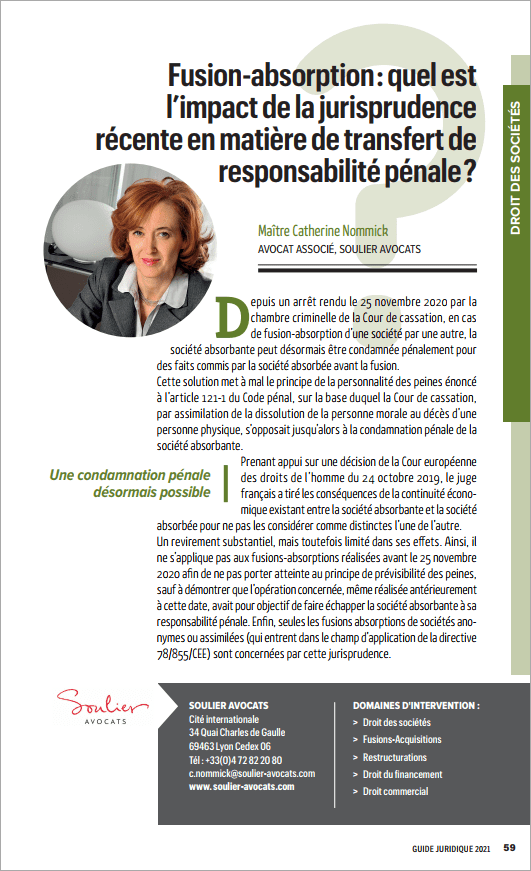Tribune de Lyon 2021 Legal Guide: “Merger by acquisition transactions: What is the impact of the recent decision on the transfer of criminal liability?”

The 2021 Legal Guide published by Tribune de Lyon offers precise and pragmatic answers to concrete issues faced by business owners/managers.
Catherine Nommick contributed to this Guide through an article entitled “Merger by acquisition transactions: What is the impact of the recent decision on the transfer of criminal liability?”.
This article is reproduced below and a courtesy English translation follows.

“Merger by acquisition” transactions: What is the impact of the recent decision on the transfer of criminal liability?[1]
Catherine Nommick, Partner, Soulier Avocats
Since a decision issued on November 25, 2020 by the Criminal Chamber of the Cour de Cassation (French Supreme Court), in a “merger by acquisition” transaction (i.e., when a company is merged into another), the acquiring company may now be held criminally liable for an offence committed by the acquired company prior to the merger.
This decision undermines the principle of the personal nature of offences and penalties set out in Article 121-1 of the French Criminal Code, on the basis of which the Cour de Cassation, which until then had equated the disappearance of a legal entity with the death of a natural person, refused that the acquiring entity be held criminally liable.
Relying on a decision handed down on October 24, 2019 by the European Court of Human Rights, the French judge drew the consequences of the economic continuity that exists between the acquired company and the acquiring company to hold that they were not to be considered as distinct from each other.
A substantial reversal of case-law, but nevertheless limited in its effects. It does not apply to mergers completed before November 25, 2020, in order not to infringe the principle of predictability of penalties, unless it can be demonstrated that the transaction in question, even if carried out prior to that date, was intended to have the acquiring company escape criminal liability. Finally, Lastly, the decision only applies to mergers that involve the acquisition of public limited companies (sociétés anonymes) or similar entities (which fall within the scope of Directive 78/855/EEC).
[1] An extended version of this article is available on our Blog: Transfer of criminal liability in merger transactions: A major reversal of case law
 Strategic Lawyering
Strategic Lawyering